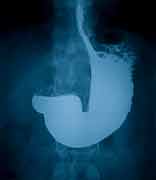
MONDAY, May 9 (HealthDay News) — Adults who undergo Roux-en-Y gastric bypass surgery show improvement in biochemical cardiac risk factors, but teens that have the procedure may realize even greater heart health benefits, according to new research.
In Roux-en-Y surgery, a very common gastric bypass procedure, surgical connections around the bowel help decrease stomach capacity and let food bypass part of the small intestine.
The new study, slated for presentation Monday at the Digestive Disease Week conference in Chicago, analyzed 99 adults and 33 adolescents, ages 14 through 18. All of the patients underwent laparoscopic Roux-en-Y gastric bypass between 2004 and 2010.
At least half of the participants already had high blood pressure, elevated cholesterol and obstructive sleep apnea prior to the surgery, according to researchers from the Stanford University section of bariatric surgery.
One year after surgery, however, both the adults and the teens showed significant improvement in total cholesterol, triglycerides (a blood fat) and homocysteine levels (a blood protein that can signal heart risk).
The researchers noted, however, that after surgery the teenagers examined showed even more improvement than the adults in terms of high-density (“good”) lipoprotein cholesterol. The adolescents’ fasting insulin — a marker of diabetes risk — fell by more than 400 percent after one year.
“The findings suggest gastric bypass may improve the health-related quality of life for certain obese teens down the road. With the emerging evidence of how early heart disease starts, we have to do something for these adolescents now, before a point of no return,” Dr. John Morton, director of bariatric surgery at Stanford Hospital & Clinics, said in a news release from the meeting’s sponsor, the American Gastroenterological Association.
The study authors note that gastric bypass is not the only treatment for obesity. “This surgery is clearly not for every obese adolescent, and it should only be done at centers with experienced, qualified surgeons,” added Morton.
Findings presented at meetings are considered preliminary since they have not undergone the rigorous peer review of data published in reputable journals.
More information
There’s more on obesity in teens at the American Academy of Pediatrics.

